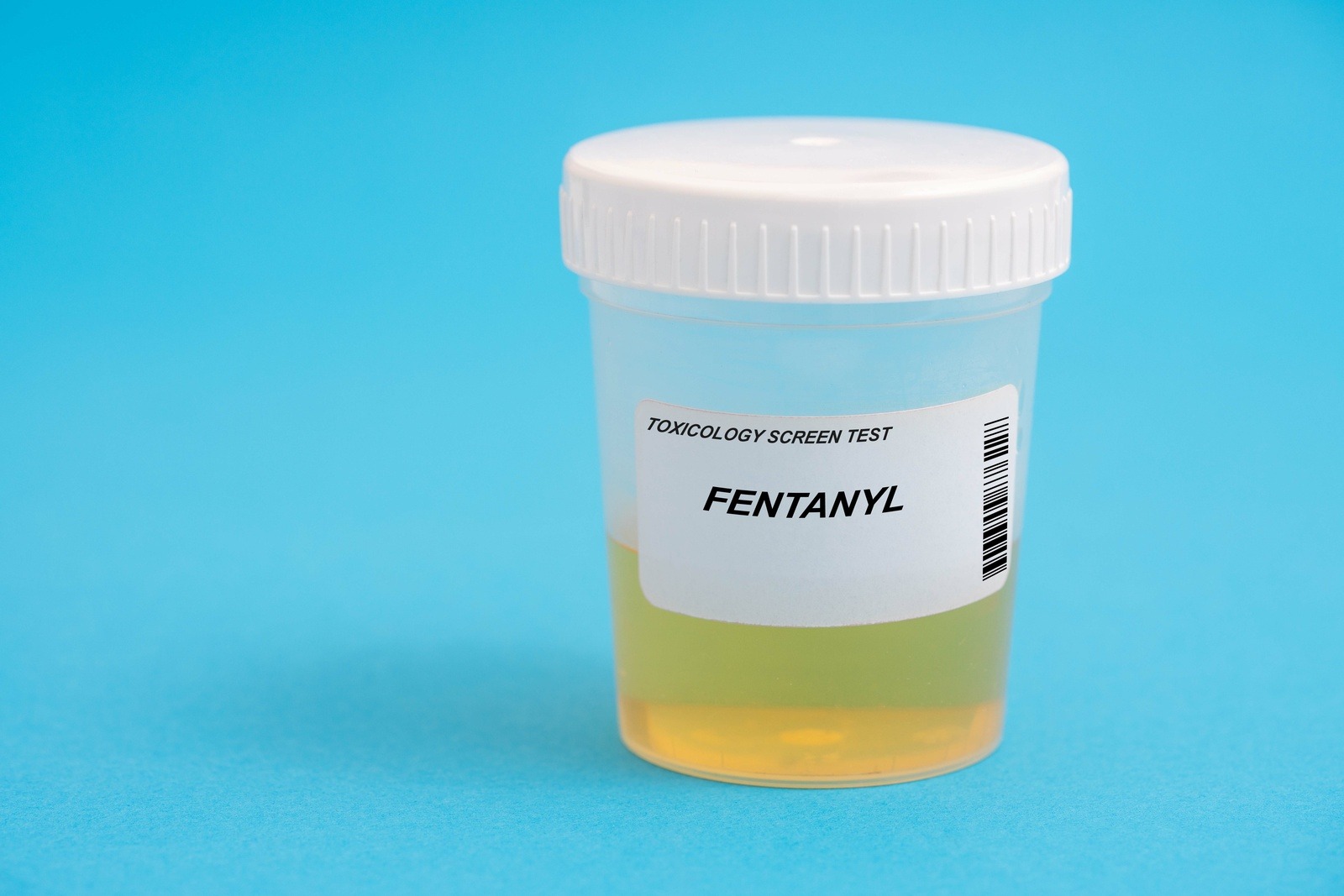How Long Does Fentanyl Stay In Urine?

- Fentanyl is a dangerously potent synthetic opioid used in medical settings and sold illegally in various forms.
- Urine drug tests can detect fentanyl in the body for 24-72 hours after use.
- Consuming fentanyl carries both short-term and long-term health risks, such as nausea, drowsiness, heart disease, and compromised immune function.
Fentanyl stays in the urine anywhere from 24 to 72 hours after the last use. However, results depend on the drug dose, the size and health of the user, and how frequently a person has used it. A regular fentanyl user with a stronger tolerance may yield positive urine test results for up to seven days due to accumulation of the drug over time.
Facts About Fentanyl
Fentanyl is a dangerously potent synthetic opioid that can be snorted, smoked, or taken orally in pill form. It is often combined with other substances, like heroin or cocaine. Fentanyl is listed as a Schedule II controlled substance, meaning it has a high potential for abuse. The use of this opioid could lead to psychological or physical dependence. Other examples of Schedule II drugs are Adderall and cocaine.[1]
In supervised medication settings, Fentanyl is used as an analgesic (pain reliever) similar to morphine but is 50 to 100 times more powerful. It is a prescription drug manufactured and used illegally, where it may be known as China Town, Dance Fever, and Friend. Tolerance builds when you need a higher dose or need to take it more frequently to get the desired effects.[2]
Urine Drug Tests
Urine drug tests are administered to help detect the presence of toxic or illicit substances in the body, including fentanyl. These are noninvasive and cost less than other tests. An individual will collect their urine in a sterile container, which is sent to a lab for further analysis. Results are typically available as early as one day later.
Urine tests, also called urinalysis, are particularly relevant for individuals seeking employment contingent on a drug test or periodic testing required by an employer. Drug screening may also be used in legal or medical settings to ensure a patient takes an appropriate medication dosage.
Fentanyl stays in the urine 24 to 72 hours after the last use and can be detected as early as 2 hours after an individual ingests it.
What Influences Fentanyl Detection In Urine?
How long fentanyl stays in a person’s system varies depending on several factors.The consumer’s age appears to be significant in determining the drug’s accurate half-life (how long half of the substance remains active).[3] Some other factors that influence fentanyl detection are:
- Individual metabolic rate
- Current body weight and body fat percentage
- How often the drug is used
- How much of the drug is consumed when used
- Current health of the user, specifically their kidney and liver function
- How hydrates the person is
- If the user is taking other medications or drugs
Side Effects Of Fentanyl
Fentanyl’s immediate effects are similar to other opioids, creating a sense of relaxation and euphoria that makes the drug so appealing to users. Its pain-relieving effects are also highly desired. Additionally, fentanyl has side effects that are not so pleasant:[4]
- Nausea and vomiting
- Constipation
- Breathing problems
- Unconsciousness
- Drowsiness and confusion
- Dizziness
Long-Term Health Risks Of Fentanyl
Regular use of fentanyl can lead to long-term health issues. These will vary depending on the method of drug ingestion. Long-term health risks include the following:
- Severe constipation that can lead to more serious issues
- Difficulty breathing, particularly while sleeping
- Heart disease
- Immune system suppression
- Mood instability and other mental health issues, such as anxiety and depression
- Reproductive system issues for both men and women
- Increased risk for bone fractures
There is also a significant risk of death from using fentanyl. Synthetic opioids like fentanyl are some of the most common substances involved in overdose deaths in the United States, with 88% of opioid overdoses involving a synthetic opioid like fentanyl.[5]
Other Drug Tests For Fentanyl
Fentanyl can also be detected in the body through hair and blood testing. However, these methods are less common than urinalysis due to cost and availability.
Hair tests have the most extended detection window, with the ability to detect the drug for up to 3 months. For each centimeter of hair, approximately one month has passed. Hair testing is informative and non-invasive; however, it is less cost-effective, and not all people have body hair available to test.
Blood testing is also a way to detect drugs, but it is more invasive. Blood can provide a clearer picture of the drug use and detect fentanyl for 1-2 days, but it is a biohazard. As a result, blood tests are not used as often as urine tests.
Fentanyl Addiction Treatment
It is daunting to battle any type of addiction, and fentanyl addiction is no different. However, with the proper treatment and support, there is hope for reclaiming your life and moving forward.
Finding an appropriate treatment approach to meet each patient’s needs is challenging but possible. Here are a few common therapeutic approaches to managing addiction to fentanyl:
- Medication-Assisted Treatment (MAT): MAT offers relief from withdrawal symptoms and supports detoxification with specialized medicines. This process can save lives. These medications are FDA-approved, designed to reduce opioid withdrawal symptoms.
- Behavioral Therapy: Individual and group therapy can help individuals struggling with addiction to process negative thought patterns in various ways. Therapy creates space for people to accept their emotions and challenge faulty thinking. Behavioral approaches may include Cognitive-Behavioral Therapy (CBT) and Acceptance and Commitment Therapy (ACT). They can help individuals feel prepared with the life skills needed to deal with stressors and modify their attitudes and behaviors related to drug use.
- Outpatient Treatment: Outpatient programs offer the same medication intervention and therapeutic services that help individuals establish sobriety but without the live-in requirements. You can maintain a flexible schedule while still pursuing long-term recovery.
- Self-Help or 12-Step Groups: Narcotics Anonymous and other like-minded groups provide peer support and a safe community for individuals pursuing sobriety.
Overcome Fentanyl Addiction
A fentanyl addiction is not something you must overcome alone. If you or someone you love is using fentanyl in a way that concerns you, professional help may be necessary. Professional fentanyl addiction treatment can help you or your loved one to recover from drug abuse and get on a path toward a healthy life free of addiction.
FAQs
Are you or a loved one struggling with Fentanyl use?

